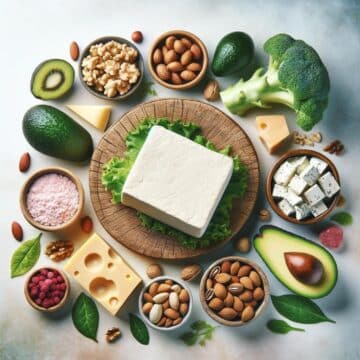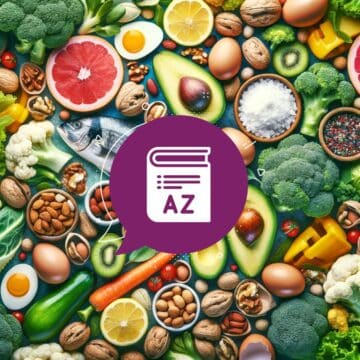Have you been on a keto diet or living a low-carb lifestyle for a while, and have found it easier than you had thought it would be? The keto flu has long been gone, and all those fats you can eat are so tasty! Hitting 75% or higher fat intake is not that difficult. At some point, it is probably a good idea to take a look at the quality of macronutrients you are taking in. Just like carbohydrates, not all fats and protein are created equal. It is therefore good to know in detail the best food to eat on a keto diet.
For example, fatty meat, in general, is good for you, providing your body with protein and fat. Still, it is beneficial to know that when animals are grass-fed instead of grain-fed, the fat profile of their meat or dairy products is improved. We get better nutritional and sensorial properties of butter from cows feeding on fresh grass and not on corn. In this case saturated fatty acids decrease, while monounsaturated fatty acids (MUFA) and polyunsaturated fatty acids (PUFA) increase [1].
MUFA have some advantage over PUFA because they are more resistant to oxidation [2]. Among PUFA, we find omega-3 and omega-6 fatty acids. These are essential, as the human body cannot produce them itself. But the ratio of their intake does matter for our health quite significantly. In general, omega-6 PUFA are pro-inflammatory while omega-3 PUFA act anti-inflammatory [3].
While human beings very probably evolved on a diet with a ratio of omega-6 to omega-3 of around one (each was consumed in more or less equal amounts), Western diets have become very deficient of omega-3 and excessive in the amounts of omega-6 fatty acids. This has led to increased incidence of many diseases, including cardiovascular disease, cancer, inflammatory, and autoimmune diseases. On the other hand, increased intake of omega-3 can suppress the adverse effects of omega-6 to some degree [4].
Keeping in mind these general facts about fat, what is the best food to eat on a keto diet?
# 1: Eggs on a Keto Diet
Taking the keto diet point of view, we can say that eggs have a perfect macronutrient ratio. Namely, more than 60% of calories comes fat, approximately 35% is protein, and around 2% of calories are carbohydrates. Yet, this ratio presents only a cherry on top of numerous health benefits that egg consumption brings. Beyond supplying the basic nutritional requirements, eggs contain many substances that have been shown to have therapeutic effects [5].
Within every egg, there is an antimicrobial activity going on. You see, the fundamental purpose of an egg is to protect an embryo from microorganisms. These antimicrobial effects are associated with particular intra-cell mechanisms that, among other things, help binding metals and vitamins.
A component of the egg white, called lysozyme, is one of the most prominent egg components. It has demonstrated antibacterial as well as an antiviral activity to such an extent, that its properties have led to its use in oral as well as dermatological health care products. Furthermore, lysozyme also acts as an immune stimulator. For example, it has been shown to support immunotherapy in patients with chronic sinusitis and bronchitis.
Even more, this fantastic egg white component has been shown to inhibit tumor formation and growth and is therefore considered to be an anti-cancer agent. Egg white and egg yolk together also have antioxidant properties, supporting the prevention of some of the oxidative stress-related diseases, such as colorectal cancer, and multifactorial degenerative diseases, including diabetes and cardiovascular disease [5].
Last, but not least, egg yolk lipids possess numerous nutritional and health benefits. Egg yolk has been included in infant formulas, as it closely resembles mother's milk. Additionally, it is perfectly safe for the infant diet. The cholesterol, found in the egg yolk, is required for the growth of infants and is a precursor of some important sex and cortex hormones. Egg yolk is a good source of choline, which has been recognized as an important nutrient in brain development, liver function, and cancer prevention.
You see, there's plenty of reasons why we consider eggs to be on the list of the best food to eat on a keto diet. One might also want to consider buying eggs as fresh as possible, but we do break it down in another article that eggs can go a long time without considerable nutritional loss.
In recent years, more and more studies have highlighted the importance of omega-3 fatty acids for fetal brain development as well as for the prevention of some neuropsychiatric disorders (e.g. depression and dementia). This has led to the development of omega-3 fatty acid-enriched eggs [5] that you can now find on supermarket shelves.
Related post: 5 days of egg fast, Egg fast recipes.
# 2: Coconut on a Ketogenic Diet
The exquisite taste of coconut is probably the main reason for its consumption for the majority of coconut kernel and kernel products consumers. Still, there have been some misconceptions about coconut fats being bad. Why?
Over 95% of coconut oil is fat. The scraped coconut is about 34% fat and coconut milk around 24% fat. Approximately 92% of this fat is saturated fat [6]. And, as we know, saturated fats are synonymous with atherosclerosis, ischaemic heart disease, and cerebrovascular disease. This is where the misconceptions have arisen from.
However, the saturated fats in coconut oil differ from the saturated fats in animals. This is because more than half of the fats in coconut are medium-chain triglycerides (MCT). These fatty acids, unlike long-chain fatty acids, are absorbed intact from the small intestine and do not undergo any degradation processes. This way, they are directly used in the body to produce energy. For this reason, they are useful in nutritional drinks for athletes, intravenous infusions, and for infant formulas.
In fact, there is a close similarity between MCT in coconut fats and human breast milk. Furthermore, MCT are not stored in fat deposits, which gives them high value for dieters. Compared to long-chain triglycerides, MCT have shown to have a greater satiating effect. Like eggs, individual coconut oil components act antibacterial. On top of all this, coconut oil helps the body to increase the absorption of calcium and magnesium ions [6].
Coconut fat is devoid of trans-fatty acids, which are thought to be more harmful than any saturated fatty acid. Furthermore, virgin coconut, made from fresh coconut kernel, and cold-pressed oil, also contain antioxidants. It is important to know that this oil is very different from hydrogenated coconut oil, which is an unnatural, altered form of coconut oil that is made completely devoid of any essential fatty acids. Just to give you an example of the potential harmfulness of this altered form of fat, some animal studies have demonstrated that feeding hydrogenated coconut oil is associated with atherosclerosis [6].
Since we can say that coconut is also the best food to eat on a keto diet, why not consider making some homemade coconut butter, keto Lamingtons or keto Panna Cotta?
# 3: Avocado on a Keto Diet
We could say that avocado is the only fruit that has been highly recommended for the low-carb and keto lifestyle population. It is so because, unlike a typical fruit, avocados contain very low sugar content with only around 0.4 g per fruit [7]. What's more, the total carbohydrate of one avocado is around 9%, of which most is fiber. Fats take up about 15%. The rest is mostly water.
One of many avocado's qualities is that it is a farm-to-market food, which means it does not require any processing or preservatives to taste good. More importantly, its nutrient profile makes it a "superfruit," especially when it comes to cardiovascular health [7].
The fats in avocados consist of 71% MUFA-rich fruit oil, 13% PUFA, and 16% saturated fatty acids [7]. The MUFA increases as the avocado ripens, while the saturated fat decreases. The fiber in avocado can help to achieve the supposedly adequate intake of 14 g of fiber per 1000 kcal; One-third of this fiber level can be obtained by eating one-half an avocado!
Besides, avocados are an excellent source of potassium and magnesium, which are of great importance when on a keto diet. Adequate potassium intake promotes blood pressure control, while magnesium may support normal vascular tone and insulin sensitivity. Moreover, this amazing fruit is one of the few foods that contain significant levels of antioxidant vitamins C and E, on top of vitamin K1 and B-vitamins. Together with many phytochemicals that avocados are also full of, these micronutrients play important roles in cardiovascular health [7].
What about weight management? A number of clinical studies suggest that avocados can support weight control [7]. The reason might lie in the fact that the fiber, water, and fruit oil combination enhances satiety. Lots of individuals, eating half an avocado for lunch, seem to feel increased satiation as compared to non-avocado eaters.
The list of avocados' health benefits just goes on and on. A number of studies have demonstrated correlations between certain avocado's components (such as lutein) and healthy aging. Specifically, studies have reported decreased risk of cartilage defects, better eye health, skin protection from UV and visible radiation, and even potential anticarcinogenic properties [7].
Can you argue that avocado could easily win the best food to eat on a keto diet competition? And can you resist a yummy and simple avocado keto mug cake or keto avocado brownies?
# 4: Olive oil on a Keto Diet
Talking about olives and olive oil, one can't help but automatically think about the Mediterranean diet. Mediterranean lifestyle has been linked to longevity, improved quality of life, and a lower incidence of cardiovascular disease, cancer, and cognitive decline. It is a high-fat diet, in which most of the fat, some 85%, is provided by a single food component, olive oil. This is why the Mediterranean diet lacks trans-fatty acids, while it has a high content of MUFA, particularly oleic acid [8].
The fundamental difference between seed oils and olive oil is that the latter is a natural product, a real juice, that contains hundreds of non-fat components that have great biological potential: Vitamin E, the carotenes, chlorophyll, and a number of phenolic compounds, to name just a few. Besides, unlike olive oil, oils derived from seeds need to be refined to become appropriate for human consumption. This means that they lose the majority of their original micro-components, making them not much more than mere sources of fat [8].
Commercial varieties of olive oil that we can find on the market and are the real juice are "Virgin olive oil" and "Extra virgin olive oil." Both of them have similar chemical compositions. What you probably don't want to buy if you want to get the most out of what the olive juice has to offer, is what is sold simply as "Olive oil." This product contains only a small percentage of virgin olive oil (5-10%) that has been added to the previously refined olive oil. As such, the content of micronutrients is way lower than that of virgin olive oils. Yet, still higher than those derived from seeds [8].
So what are the health benefits of virgin olive oil-rich diet? Studies have demonstrated that, when it replaces a carbohydrate-rich diet, triglycerides are reduced and the HDL ("good") cholesterol levels are increased. Moreover, it tends to reduce LDL ("bad") cholesterol levels, and improve glucose metabolism in diabetes.
The list of other possible positive health effects is not short. Some of these effects are related to the high content of MUFA, but others depend on the virgin oil's richness in micro components. All in all, the consumption favors a better lipid profile and promotes antioxidant and anti-inflammatory effects [8].
If olive oil was a stand-alone food, it would definitely be the best food to eat on a keto diet!
Related post: Olive oil on keto diet
# 5: Fish on a Keto Diet
When it comes to PUFA and trying to take in a healthier omega-6/omega-3 ratio, fish and fish oil are to go for. Among the omega-3 PUFA, those from fish oil are more biologically potent than those from plants [9]. The marine-derived omega-3 fatty acids are composed of eicosapentaenoic acid (EPA) and docosahexaenoic acid (DHA) that are not present in plant-derived omega-3 fatty acids (e.g. flaxseed oil). To not only talk about fat, fish is also an excellent source of protein and selenium [10].
Many studies indicate that omega-3 fatty acids have anti-inflammatory properties. This makes them potentially useful in the management of inflammatory and autoimmune diseases. When humans digest fish or fish oil, the EPA and DHA partly replace the omega-6 fatty acids [9]. This, unfortunately, does not mean that one can balance out the high amounts of omega-6 fatty acids in the Western-style diet by just adding a fish or two to their lunch. But doing so might help to remain healthy.
Studies have shown fish consumption to be related to reduced sudden cardiac death. More of the possible health benefits include lowered triglycerides, lowered blood pressure, and reduction in arrhythmia [11]. A number of clinical trials have demonstrated the benefits of dietary supplementation with fish oils in patients with autoimmune diseases, such as rheumatoid arthritis, inflammatory bowel disease, and asthma [9].
While learning about possible health improvements by consuming omega-3, let us not forget that these fatty acids are actually crucial for our health; They form our cell membranes and are necessary for normal brain functioning. Thus, lack of omega-3's in the body results in learning and memory impairment [12].
When you need protein, besides eggs, fish are the best food to eat on a keto diet!
Good sources of marine omega-3 fatty acids are salmon, mackerel, and herring, as well as sardines, wild swordfish and wild tuna [10]. Most of the time, it is better to buy a wild fish, instead of farmed, just to make sure you are really getting high amounts of omega-3, and not omega-6 fatty acids.
So, knowing all the best food to eat on a keto diet, what's on the keto menu for tomorrow? I suggest eggs and avocado, fried in coconut oil for breakfast, and a wild salmon fillet, grilled and soaked in extra virgin olive oil for lunch. Add some rosemary and green veggies. For a dessert, you can gather some ideas by browsing our keto recipes. Bon appetit!
References
[1] Couvreur, S., Hurtaud, C., Lopez, C. Delaby, L., & Peyraud, J. L. (2006). The Linear Relationship Between the Proportion of Fresh Grass in the Cow Diet, Milk Fatty Acid Composition, and Butter Properties. Journal of Dairy Science, 89(6), 1956– 1969.
[2] Ros, E. & Mataix, J. (2006). Fatty acid composition of nuts – implications for cardiovascular health. British Journal of Nutrition, 96(2), 29–35.
[3] Patterson, E., Wall, R., Fitzgerald, G. F., Ross, R. P., & Stanton, C. (2012). Health Implications of High Dietary Omega-6 Polyunsaturated Fatty Acids. Journal of Nutrition and Metabolism, 2012, 1–16.
[4] Simopolous, A. P. (2002a). The importance of the ratio of omega-6/omega-3 essential fatty acids. Biomed Pharmacother, 56(2002), 365–379.
[5] Kovacs-Nolan, J., Phillips, M., & Mine, Y. (2005). Advances in the Value of Eggs and Egg Components for Human Health. Journal of Agricultural and Food Chemistry, 53, 8421–8431.
[6] Amarasiri, W. A. D. L. & Dissanayake, A. S. (2006). Coconut fats. The Ceylon Medical Journal, 51(2), 47–51.
[7] Dreher, M. L. & Davenport, A. J. (2013). Hass Avocado Compositioan and Potential Health Effects. Critical Reviews in Food Science and Nutrition, 53(7), 738–750. doi: 10.1080/10408398.2011.556759
[8] Perez-Jimenez, F. & Ruano, J. (2007). The influence of olive oil on human health: Not a question of fat alone. Molecular Nutrition & Food Research, 51, 1199 – 1208. doi: 10.1002/mnfr.200600273
[9] Simopoulos, A. P. (2002b). Omega-3 Fatty Acids in Inflammation and Autoimmune Diseases. Journal of the American College of Nutrition, 21,(6), 495–505.
[10] Brunner, E. J., Jones, P. J. S., Friel, S., & Bartley, M. (2009). Fish, human health and marine ecosystem health: policies in collision. International Journal of Epidemiology, 38, 93–100. doi:10.1093/ije/dyn157
[11] Kris-Etherton, P. M., Harris, W. S., & Appel, L. J. (2002). Fish Consumption, Fish Oil, Omega-3 Fatty Acids, and Cardiovascular Disease. Circulation, 106, 2747–2757 . doi: 10.1161/01.CIR.0000038493.65177.94
[12] Gomez-Pinilla, F. (2008). Brain foods: the effects of nutrients on brain function. Nature Reviews Neuroscience, 9(7), 568–578. doi:10.1038/nrn2421







Peta Rahmatalla says
Hello, may I say firstly that I really enjoy reading all the recipes and information that you include in your blog. secondly as a Vegan on a Keto diet I would appreciate if you are able to include more recipes that would reflect this?
Tisa says
Hi, Peta. Thank you for the feedback! I hope you've already found few vegan recipes up here. Search for "vegan" and they will turn up.
More on the way, eventually ...
Lauren says
I like that you cite your sources! As a librarian, I can appreciate that you've done your research. Your blog is very informative and I'm learning a lot about how to make the best of my diet. Thanks!
Tisa says
Thank you for the nice feedback, Lauren!
Megha Sharma says
Oh Finally found a blog which makes sense to me. This guide is absolutely brilliant and helpful. Thank you so much for doing this!
My Sweet Keto says
Thank you for the feedback!
Bette Bench says
I've read & heard a lot about counterfeit olive oil being sold & shipped to the USA. How can we be sure what we buy is real and not counterfeit?
My Sweet Keto says
Labeled as "extra virgin olive oil" should not be counterfeit. You should be suspicious when it says just "olive oil" or "virgin olive oil" or anything that doesn't say "extra virgin olive oil" explicitly.
Wanda says
Wow! great information.
Thank you so much for explaining everything so clearly.
My Sweet Keto says
You are welcome, Wanda! Than you for the comment!
Chef William says
This is perhaps the best short list I have seen. I think I might add Avocado oil as a choice for those that are not fans of olive oil. In my kitchen we use both because avocado oil has a slightly higher heat point so I prefer to cook with it. I am lucky because I live on the coastline of Mexico (Puerto Vallarta) and I can purchase fresh fish directly from the boats when the fleet comes in about 6 in the morning.Thanks for sharing such a great article.
My Sweet Keto says
Thank you for your feedback!
Marci Collins says
Thank you for addressing the health aspect of the Keto diet and not just weight loss.
My Sweet Keto says
I appreciate your comment, thanks for reading! 🙂